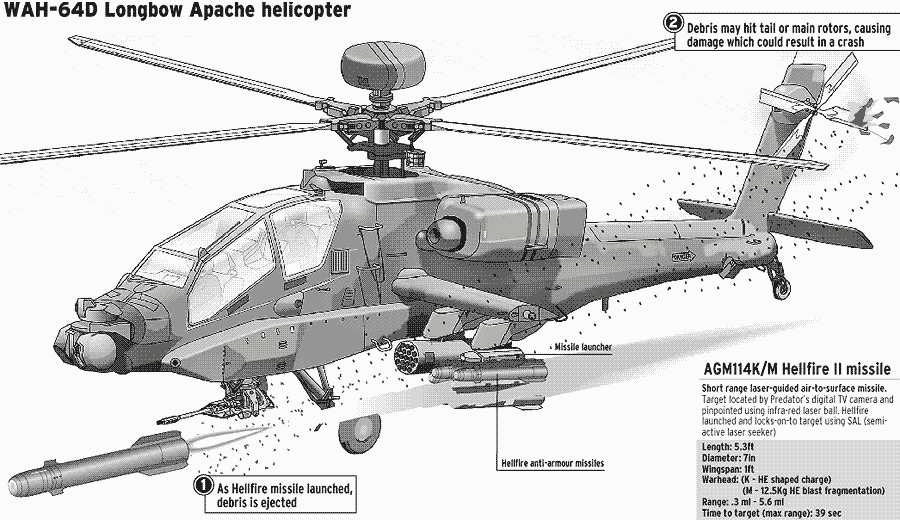Monday
March 25, 2002
WAH-64D cannot fire missiles ?
UK Army's new helicopter cannot fire missiles
( by MICHAEL SMITH for news.telegraph.co.uk ) -
The Army's new Apache attack helicopter cannot fire its Hellfire anti-tank missiles for fear that debris ejected on launching could cause catastrophic damage.
Click to enlarge photo
 The problem is confirmed by a Ministry of Defence document leaked to The Telegraph.
The MoD was unable to say how much damage could be caused. It was working with the makers to solve the problem, officials said.
But defence sources said there were serious concerns that the debris could damage the main or tail rotors, causing the helicopter to crash.
The Army is buying 67 Apache helicopters at a cost of at least £27 million each. They are being built in Britain by Westland under licence from the US manufacturers Boeing.
The US has restricted its Apache helicopters to firing missiles only during wartime and to launching them only from the right-hand side of the aircraft to try to ensure that the debris does not hit the tail rotor which is on the left-hand side.
The WAH-64 Apache, which is due to take over the anti-tank role currently performed by about a quarter of the Army's Challenger 2 tanks in three years' time, normally carries a total of eight Hellfire missiles, four on each side.
The problem comes amid worrying signs from Afghanistan that the helicopter, which is seen as providing devastating frontline firepower, may not be as effective as was hoped, particularly in hot, dusty conditions.
Five out of the seven Apache attack helicopters sent to attack al-Qa'eda terrorists during Operation Anaconda two weeks ago were disabled by machinegun fire or ancient Soviet RPG-7 rocket-propelled grenade launchers fired from the ground.
The five helicopters had to be taken back to the US base at Bagram, north of Kabul, and replaced by new aircraft flown out from America.
Charles Heyman, editor of Jane's World Armies, said yesterday that there were also serious problems with sand and dust getting into the engines.
"In northern Europe you would expect to have around 90 per cent serviceability for these aircraft," he said. "But we are hearing reports that in Afghanistan it may be as low as 60 per cent."
The introduction of the Army Air Corp's first operational Apache squadron has already been delayed by at least eight months by software problems with the Full Mission simulator that will train the pilots.
The problem is confirmed by a Ministry of Defence document leaked to The Telegraph.
The MoD was unable to say how much damage could be caused. It was working with the makers to solve the problem, officials said.
But defence sources said there were serious concerns that the debris could damage the main or tail rotors, causing the helicopter to crash.
The Army is buying 67 Apache helicopters at a cost of at least £27 million each. They are being built in Britain by Westland under licence from the US manufacturers Boeing.
The US has restricted its Apache helicopters to firing missiles only during wartime and to launching them only from the right-hand side of the aircraft to try to ensure that the debris does not hit the tail rotor which is on the left-hand side.
The WAH-64 Apache, which is due to take over the anti-tank role currently performed by about a quarter of the Army's Challenger 2 tanks in three years' time, normally carries a total of eight Hellfire missiles, four on each side.
The problem comes amid worrying signs from Afghanistan that the helicopter, which is seen as providing devastating frontline firepower, may not be as effective as was hoped, particularly in hot, dusty conditions.
Five out of the seven Apache attack helicopters sent to attack al-Qa'eda terrorists during Operation Anaconda two weeks ago were disabled by machinegun fire or ancient Soviet RPG-7 rocket-propelled grenade launchers fired from the ground.
The five helicopters had to be taken back to the US base at Bagram, north of Kabul, and replaced by new aircraft flown out from America.
Charles Heyman, editor of Jane's World Armies, said yesterday that there were also serious problems with sand and dust getting into the engines.
"In northern Europe you would expect to have around 90 per cent serviceability for these aircraft," he said. "But we are hearing reports that in Afghanistan it may be as low as 60 per cent."
The introduction of the Army Air Corp's first operational Apache squadron has already been delayed by at least eight months by software problems with the Full Mission simulator that will train the pilots.
The Apache problem is the latest in a series of embarrassing equipment problems to hit the forces. The SA-80 rifle had to be modified at a cost of £80 million after it consistently jammed on operations in Kosovo and Sierra Leone.
And the 12-year Bowman project to replace Army radio sets that dated back to the Falklands was abandoned 18 months ago. Soldiers operating in the Balkans were forced to use their mobile telephones to contact each other.
During the Kosovo campaign the RAF ran out of precision guided weapons that could bomb through clouds.
Westland timeline
AH-64 Apache
